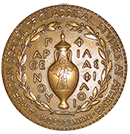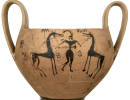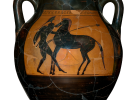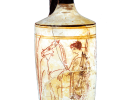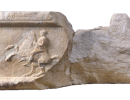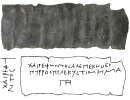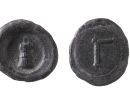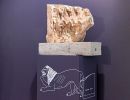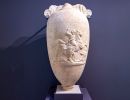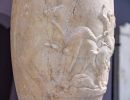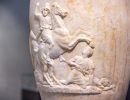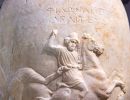Because horses are by nature sensitive, fearful of danger, and prone to spook or bolt, they are not ideal candidates for military action. Therefore, they require intensive training to become desensitized and capable of engaging in physical combat on a noisy, chaotic battlefield. Raising, exercising and fielding a cavalry corps was an expensive and timeconsuming undertaking and required an arena or parade ground for daily drills. Young horsemen (ippeis) were trained by the cavalry officers and even learned to race up and down hill according to Xenophon. They were called to action in corps pulled from the ten Attic tribes established by the democratic reforms of Kleisthenes.
Horses came to play a key role in military engagements, but exactly when Athens established a permanent cavalry remains a question. The laws of Drakon and Solon both mention hippeis, but whether they mean soldiers fighting on horseback, or simply hoplites who are conveyed to the battle via their mounts is not clear. A small troop of such hippeis almost certainly served as a border patrol for Attica in the 6th century BCE. In the mid-fifth century the cavalry grew to 300 and eventually 1,000 at the beginning of the Peloponnesian Wars (431 BCE.). In addition, there were 200 archers who rode on horseback (hippotoxotai). This enlarged cavalry served the Athenian state throughout the Peloponnesian Wars, but declined in importance afterwards.
Our best evidence for the Athenian cavalry comes from the excavations in the Athenian Agora and the Kerameikos. Wells there have produced discarded objects such as clay tokens stamped with the names of hipparchs, small lead tablets listing identifying information about each horse, and lead tokens depicting pieces of armor which were distributed to members of the cavalry. Given the location of these discards, we can surmise that the office of the cavalry commanders, the hipparcheion, was located in the northwest corner of the Agora. It was in this vicinity that the cavalry horses were subject to an inspection (dokimasia) to determine if they were fit for action.
-
268
In the Geometric period horses are commonly shown on large funerary vases transporting warriors on chariots. This small vessels depicts a helmeted warrior holding the rains of two horses.
He is identifiable by the sword at his waist and appears to be training horses.Kantharos with warrior and two horses
Attic Geometic, late 8th century BCE
Kerameikos Museum 268 - Ephorate of Antiquities of the City of Athens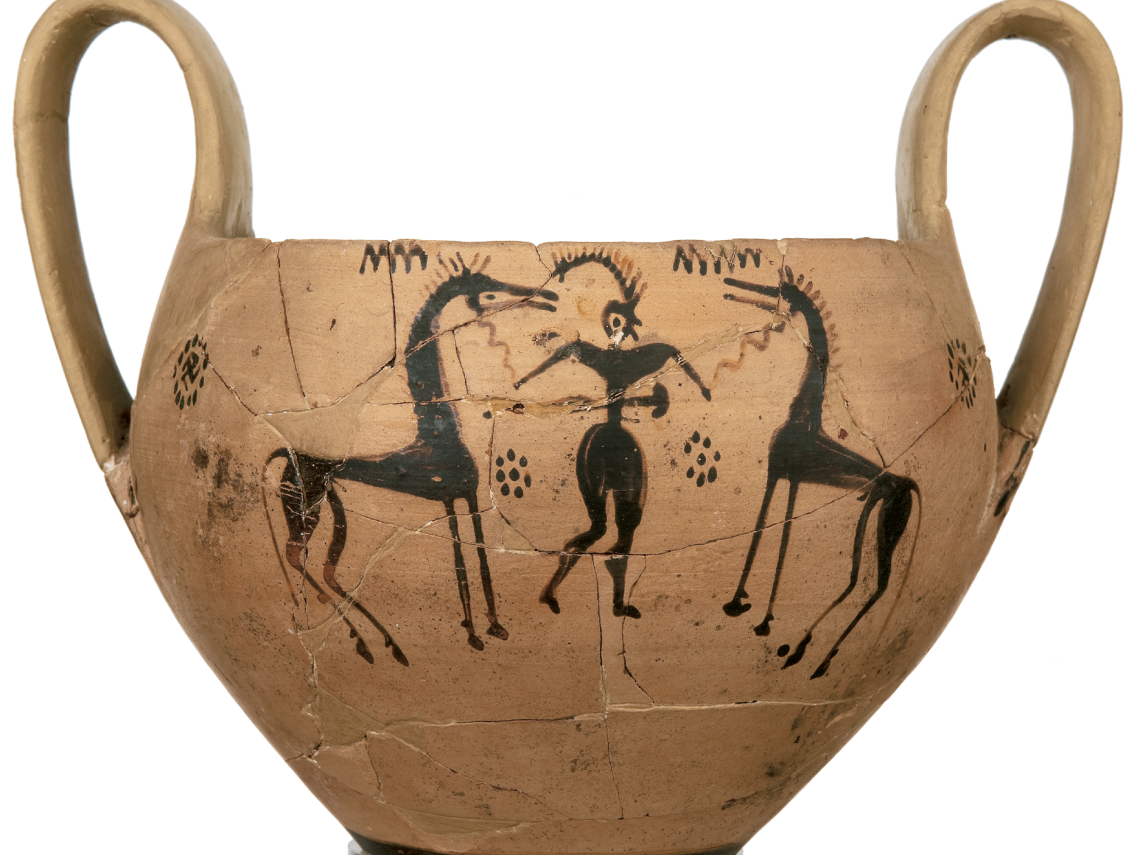
-
48 2720
It was tricky to mount a horse when carrying a shield and two spears, but Xenophon provides instructions: namely the warrior should vault onto the horse’s back with the use of the spear.
This large vase, a masterpiece of Athenian painting, was used for the burial of an infant.Amphora, Attic black-figure, name-vase of the Hypobibazon Class, ca. 510 BCE
Kerameikos Museum 48
Ephorate of Antiquities of the City of Athens
-
2011.05
A list of the names of twelve hipparchs and phylarchs (rulers of a tribe) is recorded on this stele. They are being honored by the Tarantinoi, a division of the light-armed cavalry, with gold crowns for their service to the city. Coincidentally some of the same names appear on the lead tablets discarded in the nearby well. This evidence strongly suggests that the Hipparcheion was located in the northwest area of the Agora.
Stele with cavalry inscription, Pentelic marble, dated 281/0 BCE
Agora Excavations I 7587 - Ephorate of Antiquities of the City of Athens
-
14521
The lekythos was a perfumed oil flask frequently deposited in graves. This white-ground example depicts a young cavalry man with two spears.
Attic white-ground, attributed to the Reed Painter, ca. 420 BCE
Found in the Botanical Gardens, Athens - Athens National Archaeological Museum A 14521
-
agora i7515
HIEROPHANES SON OF POLYARATOS from the deme (township) of ALOPEKE, a member of the tribe ANTIOCHIS, is portrayed on this marble base which once served for acavalry dedication. He is represented as a bearded man wearing a helmet and with a sword tucked under his left arm. His horse is shown in a levade, a demanding pose in which the horse rises on its bent hind legs and draws in the front legs.
Base with relief of a cavalry officer
Marble, 4th century BCE
Agora Excavations I 7515 - Ephorate of Antiquities of the City of Athens
-
il 1590
The lead strips record the name of the horse’s owner, its color, its brand (the snake being themost prevalent), and its value (the average being 700 drachms or two years’ wages).
Lead identification tablets of the cavalry, 3rdcentury BCE - Agora Excavations, Crossroads Well, Il 1545, 1590, 1539
Ephorate of Antiquities of the City of Athens
-
tokens
The lead tokens may represent pieces of military equipment loaned out from the state arsenal to members of the cavalry.
Lead tokens depicting armor, 3rd century BCE - Agora Excavations IL 1572,1575, 1576, 1579
Ephorate of Antiquities of the City of Athen
-
bf3i1546521 wo 579 1140 855 80 c
Four youthful horsemen gallop in tight formation to the right on this relief from the Agora; their bearded and helmeted commander is at the far left. We know from the back of the relief which shows a lion in outline and names their tribal affiliation that they belong to the tribe of Leontis. The inscription states that the tribe ‘won” so we can assume that this marble monument commemorates their victory in the anthippasia, a mock cavalry battle held during the Panathenaic festival.
Commemorative relief for the tribe Leontis, Pentelic marble, ca. 400 BCE
Agora Excavations I 7167 - Ephorate of Antiquities of the City of Athens
-
bf3i1507513 wo 583 1140 855 80 c
Found in 1969 on the road to the Lycaeum, this large marble loutrophoros (a ceremonial vase used to carry water), broken at the top and bottom, is one of the most complex battle scenes from ancient Athens. There are five fighters: two dead lying on the ground, two dying, and only one victorious. The victor on horseback, wearing a Boeotian helmet and a short tunic, is plunging his spear into his kneeling opponent. Another rider is falling headlong off his horse, but still holds the reins in right hand.
The inscription reads: PHILON, SON OF ARISTOKLEOS, OF MELITE.
Loutrophoros of Philon Pentelic marble, mid-4th century BCE - Ephorate of Antiquities of the City of Athens M 977
-
bf3i1531519 wo
Found in 1969 on the road to the Lycaeum, this large marble loutrophoros (a ceremonial vase used to carry water), broken at the top and bottom, is one of the most complex battle scenes from ancient Athens. There are five fighters: two dead lying on the ground, two dying, and only one victorious. The victor on horseback, wearing a Boeotian helmet and a short tunic, is plunging his spear into his kneeling opponent. Another rider is falling headlong off his horse, but still holds the reins in right hand.
The inscription reads: PHILON, SON OF ARISTOKLEOS, OF MELITE.
Loutrophoros of Philon Pentelic marble, mid-4th century BCE - Ephorate of Antiquities of the City of Athens M 977
-
bf3i1518517 wo
Found in 1969 on the road to the Lycaeum, this large marble loutrophoros (a ceremonial vase used to carry water), broken at the top and bottom, is one of the most complex battle scenes from ancient Athens. There are five fighters: two dead lying on the ground, two dying, and only one victorious. The victor on horseback, wearing a Boeotian helmet and a short tunic, is plunging his spear into his kneeling opponent. Another rider is falling headlong off his horse, but still holds the reins in right hand.
The inscription reads: PHILON, SON OF ARISTOKLEOS, OF MELITE.
Loutrophoros of Philon Pentelic marble, mid-4th century BCE - Ephorate of Antiquities of the City of Athens M 977
-
bf3i1510514 wo
Found in 1969 on the road to the Lycaeum, this large marble loutrophoros (a ceremonial vase used to carry water), broken at the top and bottom, is one of the most complex battle scenes from ancient Athens. There are five fighters: two dead lying on the ground, two dying, and only one victorious. The victor on horseback, wearing a Boeotian helmet and a short tunic, is plunging his spear into his kneeling opponent. Another rider is falling headlong off his horse, but still holds the reins in right hand.
The inscription reads: PHILON, SON OF ARISTOKLEOS, OF MELITE.
Loutrophoros of Philon Pentelic marble, mid-4th century BCE - Ephorate of Antiquities of the City of Athens M 977
In the Geometric period horses are commonly shown on large funerary vases transporting warriors on chariots. This small vessels depicts a helmeted warrior holding the rains of two horses.
He is identifiable by the sword at his waist and appears to be training horses.
Kantharos with warrior and two horses
Attic Geometic, late 8th century BCE
Kerameikos Museum 268 - Ephorate of Antiquities of the City of Athens
It was tricky to mount a horse when carrying a shield and two spears, but Xenophon provides instructions: namely the warrior should vault onto the horse’s back with the use of the spear.
This large vase, a masterpiece of Athenian painting, was used for the burial of an infant.
Amphora, Attic black-figure, name-vase of the Hypobibazon Class, ca. 510 BCE
Kerameikos Museum 48
Ephorate of Antiquities of the City of Athens
A list of the names of twelve hipparchs and phylarchs (rulers of a tribe) is recorded on this stele. They are being honored by the Tarantinoi, a division of the light-armed cavalry, with gold crowns for their service to the city. Coincidentally some of the same names appear on the lead tablets discarded in the nearby well. This evidence strongly suggests that the Hipparcheion was located in the northwest area of the Agora.
Stele with cavalry inscription, Pentelic marble, dated 281/0 BCE
Agora Excavations I 7587 - Ephorate of Antiquities of the City of Athens
The lekythos was a perfumed oil flask frequently deposited in graves. This white-ground example depicts a young cavalry man with two spears.
Attic white-ground, attributed to the Reed Painter, ca. 420 BCE
Found in the Botanical Gardens, Athens - Athens National Archaeological Museum A 14521
HIEROPHANES SON OF POLYARATOS from the deme (township) of ALOPEKE, a member of the tribe ANTIOCHIS, is portrayed on this marble base which once served for acavalry dedication. He is represented as a bearded man wearing a helmet and with a sword tucked under his left arm. His horse is shown in a levade, a demanding pose in which the horse rises on its bent hind legs and draws in the front legs.
Base with relief of a cavalry officer
Marble, 4th century BCE
Agora Excavations I 7515 - Ephorate of Antiquities of the City of Athens
The lead strips record the name of the horse’s owner, its color, its brand (the snake being themost prevalent), and its value (the average being 700 drachms or two years’ wages).
Lead identification tablets of the cavalry, 3rdcentury BCE - Agora Excavations, Crossroads Well, Il 1545, 1590, 1539
Ephorate of Antiquities of the City of Athens
The lead tokens may represent pieces of military equipment loaned out from the state arsenal to members of the cavalry.
Lead tokens depicting armor, 3rd century BCE - Agora Excavations IL 1572,1575, 1576, 1579
Ephorate of Antiquities of the City of Athen
Four youthful horsemen gallop in tight formation to the right on this relief from the Agora; their bearded and helmeted commander is at the far left. We know from the back of the relief which shows a lion in outline and names their tribal affiliation that they belong to the tribe of Leontis. The inscription states that the tribe ‘won” so we can assume that this marble monument commemorates their victory in the anthippasia, a mock cavalry battle held during the Panathenaic festival.
Commemorative relief for the tribe Leontis, Pentelic marble, ca. 400 BCE
Agora Excavations I 7167 - Ephorate of Antiquities of the City of Athens
Found in 1969 on the road to the Lycaeum, this large marble loutrophoros (a ceremonial vase used to carry water), broken at the top and bottom, is one of the most complex battle scenes from ancient Athens. There are five fighters: two dead lying on the ground, two dying, and only one victorious. The victor on horseback, wearing a Boeotian helmet and a short tunic, is plunging his spear into his kneeling opponent. Another rider is falling headlong off his horse, but still holds the reins in right hand.
The inscription reads: PHILON, SON OF ARISTOKLEOS, OF MELITE.
Loutrophoros of Philon Pentelic marble, mid-4th century BCE - Ephorate of Antiquities of the City of Athens M 977
Found in 1969 on the road to the Lycaeum, this large marble loutrophoros (a ceremonial vase used to carry water), broken at the top and bottom, is one of the most complex battle scenes from ancient Athens. There are five fighters: two dead lying on the ground, two dying, and only one victorious. The victor on horseback, wearing a Boeotian helmet and a short tunic, is plunging his spear into his kneeling opponent. Another rider is falling headlong off his horse, but still holds the reins in right hand.
The inscription reads: PHILON, SON OF ARISTOKLEOS, OF MELITE.
Loutrophoros of Philon Pentelic marble, mid-4th century BCE - Ephorate of Antiquities of the City of Athens M 977
Found in 1969 on the road to the Lycaeum, this large marble loutrophoros (a ceremonial vase used to carry water), broken at the top and bottom, is one of the most complex battle scenes from ancient Athens. There are five fighters: two dead lying on the ground, two dying, and only one victorious. The victor on horseback, wearing a Boeotian helmet and a short tunic, is plunging his spear into his kneeling opponent. Another rider is falling headlong off his horse, but still holds the reins in right hand.
The inscription reads: PHILON, SON OF ARISTOKLEOS, OF MELITE.
Loutrophoros of Philon Pentelic marble, mid-4th century BCE - Ephorate of Antiquities of the City of Athens M 977
Found in 1969 on the road to the Lycaeum, this large marble loutrophoros (a ceremonial vase used to carry water), broken at the top and bottom, is one of the most complex battle scenes from ancient Athens. There are five fighters: two dead lying on the ground, two dying, and only one victorious. The victor on horseback, wearing a Boeotian helmet and a short tunic, is plunging his spear into his kneeling opponent. Another rider is falling headlong off his horse, but still holds the reins in right hand.
The inscription reads: PHILON, SON OF ARISTOKLEOS, OF MELITE.
Loutrophoros of Philon Pentelic marble, mid-4th century BCE - Ephorate of Antiquities of the City of Athens M 977
